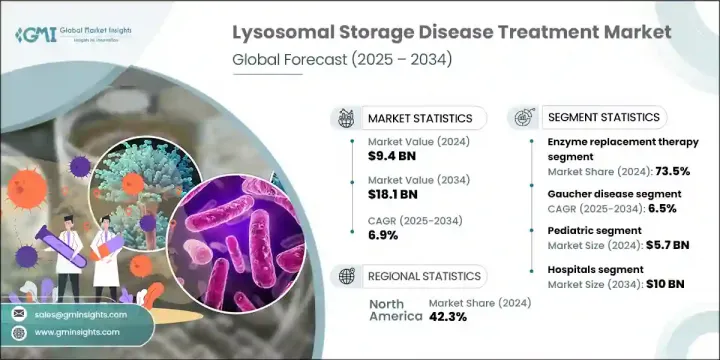
|
시장보고서
상품코드
1797717
리소좀 축적 질환 치료 시장 기회, 성장 촉진요인, 산업 동향 분석 및 예측(2025-2034년)Lysosomal Storage Disease Treatment Market Opportunity, Growth Drivers, Industry Trend Analysis, and Forecast 2025 - 2034 |
||||||
세계의 리소좀 축적 질환 치료 시장은 2024년에는 94억 달러로 평가되었으며 CAGR 6.9%를 나타내 2034년에는 181억 달러에 이를 것으로 추정됩니다.
패브리병, 고쉐병, 폼페병 등 희귀유전성 질환의 이환율 증가가 시장 성장의 큰 촉진요인이 되고 있습니다. 효소 보충 요법이나 유전자 치료의 개발은 희귀의약품(오판 드러그)에 지정되는 규제 프레임워크과 함께 이러한 질환의 치료 개발을 가속시키고 있습니다. 현재, 치료법에는 효소 보충 요법, 저분자제, 유전자 치료 등이 있어, 모두 환자의 QOL과 임상 결과의 개선을 목적으로 하고 있습니다.

사노피, 아미카스 세라퓨틱스, 바이오마린, 다케다 약품산업, 오차드 세라퓨틱스 등 주요 기업들은 세계 판매망의 확대와 신규 치료법의 혁신에 적극적으로 임하고 있습니다. 신생아 스크리닝 프로그램의 확대와 광범위한 계발 활동으로 조기 진단과 조기 개입이 가능하며, 이는 최적의 치료 반응과 장기 예후에 필수적입니다. 조기 발견 증가는 진단 및 치료제 수요를 밀어 올리고 시장 역학을 재구성하고 파이프라인의 성장을 가속합니다.
| 시장 범위 | |
|---|---|
| 시작 연도 | 2024년 |
| 예측 연도 | 2025-2034년 |
| 시작 금액 | 94억 달러 |
| 예측 금액 | 181억 달러 |
| CAGR | 6.9% |
2024년 효소 보충요법 분야의 점유율은 73.5%에 달했습니다. 효소 보충 요법의 보급은 진단 프로그램의 강화와 질병에 대한 인식의 향상에 의한 보급에 따릅니다. 효소 결핍성 리소좀병의 치료에 있어서 이러한 치료법의 높은 효능은 환자의 대폭적인 개선으로 이어져, 제약 기업이 공동 연구나 자사 개발을 통해 이러한 치료법의 확대·강화에 투자할 것을 촉구하고 있습니다.
2024년의 무코다당증 치료제 부문의 점유율은 27.4%였습니다. MPS 치료 시장 확대는 신속한 승인 패스웨이와 희귀 질병 의약품(오판 약국) 규정에 따른 세금 공제와 같은 규제 우대 조치에 의해 지원됩니다. 세포 치료, B 세포 치료, 유전자 편집 접근법에 대한 제약 기업 및 생명 공학 기업의 투자는 급속히 확대되고 있으며, 연구소 인프라 강화, 분석 개발 및 광범위한 임상시험 지원이 필요합니다.
북미의 리소좀 축적 질환 치료 2024년 점유율은 42.3%를 기록했습니다. 미국과 캐나다가 주도하고 있는 이유는 고비용의 희귀질환 치료에 대한 보험 적용이 확고하고 LSD 연구에 대한 공적 자금이 충실하기 때문입니다. NIH와 캐나다의 보건연구기관과 같은 기관은 많은 양의 보조금을 제공하여 연구를 지원하고, 치료법의 혁신과 미래의 치료 파이프라인의 성장을 가능하게 하고 있습니다.
리소좀 축적 질환 치료 시장에서 활동하고 있는 주요 기업으로는 Sigilon Therapeutics, Pfizer, Orphazyme, Alexion Pharmaceuticals, Sangamo Therapeutics, JCR Pharmaceuticals, Avrobio, Genzyme(Sanofi), Orchard Therapeutics, Ther Marupinics, 다케다 약품산업, BioMaru 등이 있습니다. 선두 기업은 유전자 편집 플랫폼이나 차세대 효소 보충 치료와 같은 혁신적인 치료에 투자함으로써 그 지위를 강화하고 있습니다. 학술기관이나 생명공학기업과의 전략적 제휴로 조사 능력도 확대되고 있습니다. 각 회사는 또한 시장에 대한 접근을 보장하기 위해 견고한 세계 유통망을 개척하는 한편 조기 진단률을 높이기 위해 목표를 세운 계발 활동과 스크리닝을 추진하고 있습니다. 관민 파트너십과 등록 기반 조사를 통해 기업은 임상시험을 가속화하고 환자 모집을 강화하고 있습니다.
목차
제1장 조사 방법과 범위
제2장 주요 요약
제3장 업계 인사이트
- 생태계 분석
- 업계에 미치는 영향요인
- 성장 촉진요인
- 신생아 스크리닝 프로그램에 의한 진단 증가
- 유전자 치료 및 효소 치료의 파이프라인 확대
- 분자 및 바이오마커에 기초한 진단의 진보
- 질병 수식 및 치유 요법으로의 전환 증가
- 업계의 잠재적 위험 및 과제
- 높은 치료비
- 저·중소득국(LMIC)에 있어서의 보급의 한계
- 시장 기회
- 유전자 치료 및 유전자 편집 수요 증가
- 희귀질환 전문 치료 센터 증가
- 성장 촉진요인
- 성장 가능성 분석
- 규제 상황
- 기술의 상황
- 현재의 기술 동향
- 신흥기술
- 향후 시장 동향
- 가격 분석
- Porter's Five Forces 분석
- PESTEL 분석
제4장 경쟁 구도
- 서론
- 기업의 시장 점유율 분석
- 기업 매트릭스 분석
- 주요 시장 기업의 경쟁 분석
- 경쟁 포지셔닝 매트릭스
- 주요 발전
- 합병과 인수
- 파트너십 및 협업
- 신제품 발매
- 확장 계획
제5장 시장 추계·예측 : 치료 유형별(2021-2034년)
- 주요 동향
- 효소 대체 요법
- 줄기세포 이식
- 기질 감소 요법
- 기타 치료 유형
제6장 시장 추계·예측 : 질환 유형별(2021-2034년)
- 주요 동향
- 고셔병
- 점액다당류증
- 폼페병
- 파브리병
- 기타 질병의 유형
제7장 시장 추계·예측 : 연령별(2021-2034년)
- 주요 동향
- 소아
- 성인
제8장 시장 추계·예측 : 최종 용도별(2021-2034년)
- 주요 동향
- 병원
- 전문 클리닉
- 재택 케어
- 기타 용도
제9장 시장 추계·예측 : 지역별(2021-2034년)
- 주요 동향
- 북미
- 미국
- 캐나다
- 유럽
- 독일
- 영국
- 프랑스
- 스페인
- 이탈리아
- 네덜란드
- 아시아태평양
- 중국
- 일본
- 인도
- 호주
- 한국
- 라틴아메리카
- 브라질
- 멕시코
- 아르헨티나
- 중동 및 아프리카
- 남아프리카
- 사우디아라비아
- 아랍에미리트(UAE)
제10장 기업 프로파일
- Alexion Pharmaceuticals
- Amicus Therapeutics
- Avrobio
- BioMarin
- JCR Pharmaceuticals
- Johnson & Johnson(Actelion Pharmaceuticals)
- Orchard Therapeutics
- Orphazyme
- Pfizer
- Sanofi(Genzyme Corporation)
- Sigilon Therapeutics
- Sangamo therapeutics
- Takeda Pharmaceutical Company(Shire)
The Global Lysosomal Storage Disease Treatment Market was valued at USD 9.4 billion in 2024 and is estimated to grow at a CAGR of 6.9% to reach USD 18.1 billion by 2034. The growing incidence of rare genetic disorders such as Fabry, Gaucher, and Pompe disease is a significant driver of market growth. Advances in enzyme replacement therapies and gene therapies-coupled with regulatory frameworks that grant orphan drug designation-are accelerating therapeutic development for these conditions. The treatment landscape now includes enzyme replacement, small molecule drugs, and gene-based interventions, all aimed at improving patient quality of life and clinical outcomes.

Leading companies like Sanofi, Amicus Therapeutics, BioMarin, Takeda Pharmaceutical, and Orchard Therapeutics are actively involved in global distribution expansion and innovation in novel treatment modalities. Expanding newborn-screening programs and broader awareness initiatives are enabling earlier diagnosis and intervention, which is critical for optimal treatment response and long-term prognosis. Increased early detection is boosting demand for both diagnostics and therapeutics, reshaping market dynamics and driving pipeline growth.
| Market Scope | |
|---|---|
| Start Year | 2024 |
| Forecast Year | 2025-2034 |
| Start Value | $9.4 Billion |
| Forecast Value | $18.1 Billion |
| CAGR | 6.9% |
The enzyme replacement therapy segment held a 73.5% share in 2024. Its prevalence is due to widespread adoption through enhanced diagnostic programs and better disease awareness. The high efficacy of these treatments in managing enzyme-deficient lysosomal diseases has led to substantial patient improvement, prompting pharmaceutical companies to invest in expanding and enhancing these therapies through collaborations and in-house development.
The mucopolysaccharidoses therapies segment held a 27.4% share in 2024. Market expansion for MPS treatment is supported by regulatory incentives, including expedited approval pathways and tax credits offered under orphan drug provisions. Investment from pharmaceutical and biotech companies in cell therapy, engineered B-cell treatments, and gene editing approaches is growing rapidly, necessitating enhanced laboratory infrastructure, assay development, and extensive clinical trial support.
North America Lysosomal Storage Disease Treatment Market held a 42.3% share in 2024. The U.S. and Canada lead due to robust insurance coverage for high-cost rare disease treatments and substantial public funding for LSD research. Institutes such as the NIH and Canadian health research agencies provide significant grants to support research, enabling therapeutic innovation and growth of future treatment pipelines.
Key companies active in the Lysosomal Storage Disease Treatment Market include Sigilon Therapeutics, Pfizer, Orphazyme, Alexion Pharmaceuticals, Sangamo Therapeutics, JCR Pharmaceuticals, Avrobio, Genzyme (Sanofi), Orchard Therapeutics, Takeda Pharmaceutical Company, BioMarin, and Amicus Therapeutics. Leading players are strengthening their position by investing in innovative therapies like gene editing platforms and next-generation enzyme replacement treatments. Strategic collaborations with academic institutions and biotech firms are expanding research capabilities. Companies are also developing robust global distribution networks to ensure market access, while engaging in targeted awareness and screening initiatives to boost early diagnosis rates. Through public-private partnerships and registry-based research, firms are accelerating clinical trials and enhancing patient recruitment.
Table of Contents
Chapter 1 Methodology and Scope
- 1.1 Market scope and definition
- 1.2 Research design
- 1.2.1 Research approach
- 1.2.2 Data collection methods
- 1.3 Data mining sources
- 1.3.1 Global
- 1.3.2 Regional/Country
- 1.4 Base estimates and calculations
- 1.4.1 Base year calculation
- 1.4.2 Key trends for market estimation
- 1.5 Primary research and validation
- 1.5.1 Primary sources
- 1.6 Forecast model
- 1.7 Research assumptions and limitations
Chapter 2 Executive Summary
- 2.1 Industry 3600 synopsis
- 2.2 Key market trends
- 2.2.1 Regional trends
- 2.2.2 Treatment type trends
- 2.2.3 Disease type trends
- 2.2.4 Age group trends
- 2.2.5 End use trends
- 2.3 CXO perspectives: Strategic imperatives
- 2.3.1 Key decision points for industry executives
- 2.3.2 Critical success factors for market players
- 2.4 Future outlook and strategic recommendations
Chapter 3 Industry Insights
- 3.1 Industry ecosystem analysis
- 3.2 Industry impact forces
- 3.2.1 Growth drivers
- 3.2.1.1 Increasing diagnosis due to newborn-screening programs
- 3.2.1.2 Growing pipeline of gene and enzyme therapies
- 3.2.1.3 Advancement in molecular and biomarker-based diagnosis
- 3.2.1.4 Increasing shift towards disease-modifying and curative therapies
- 3.2.2 Industry pitfalls and challenges
- 3.2.2.1 High cost of treatment
- 3.2.2.2 Limited penetration in low-and middle-income countries (LMICs)
- 3.2.3 Market opportunities
- 3.2.3.1 Growing demand of gene therapy and genome editing
- 3.2.3.2 Rise in specialized rare disease treatment centers
- 3.2.1 Growth drivers
- 3.3 Growth potential analysis
- 3.4 Regulatory landscape
- 3.4.1 North America
- 3.4.2 Europe
- 3.4.3 Asia Pacific
- 3.4.4 Latin America
- 3.4.5 Middle East and Africa
- 3.5 Technology landscape
- 3.5.1 Current technological trends
- 3.5.2 Emerging technologies
- 3.6 Future market trends
- 3.7 Pricing analysis
- 3.8 Porter's analysis
- 3.9 PESTEL analysis
Chapter 4 Competitive Landscape, 2024
- 4.1 Introduction
- 4.2 Company market share analysis
- 4.3 Company matrix analysis
- 4.4 Competitive analysis of major market players
- 4.5 Competitive positioning matrix
- 4.6 Key developments
- 4.6.1 Merger and acquisition
- 4.6.2 Partnership and collaboration
- 4.6.3 New product launches
- 4.6.4 Expansion plans
Chapter 5 Market Estimates and Forecast, By Treatment Type, 2021 - 2034 ($ Mn)
- 5.1 Key trends
- 5.2 Enzyme replacement therapy
- 5.3 Stem cell transplants
- 5.4 Substrate reduction therapy
- 5.5 Other treatment types
Chapter 6 Market Estimates and Forecast, By Disease Type, 2021 - 2034 ($ Mn)
- 6.1 Key trends
- 6.2 Gaucher disease
- 6.3 Mucopolysaccharidoses
- 6.4 Pompe disease
- 6.5 Fabry disease
- 6.6 Other disease types
Chapter 7 Market Estimates and Forecast, By Age Group, 2021 - 2034 ($ Mn)
- 7.1 Key trends
- 7.2 Pediatric
- 7.3 Adult
Chapter 8 Market Estimates and Forecast, By End Use, 2021 - 2034 ($ Mn)
- 8.1 Key trends
- 8.2 Hospitals
- 8.3 Specialty clinics
- 8.4 Homecare settings
- 8.5 Other end use
Chapter 9 Market Estimates and Forecast, By Region, 2021 - 2034 ($ Mn)
- 9.1 Key trends
- 9.2 North America
- 9.2.1 U.S.
- 9.2.2 Canada
- 9.3 Europe
- 9.3.1 Germany
- 9.3.2 UK
- 9.3.3 France
- 9.3.4 Spain
- 9.3.5 Italy
- 9.3.6 Netherlands
- 9.4 Asia Pacific
- 9.4.1 China
- 9.4.2 Japan
- 9.4.3 India
- 9.4.4 Australia
- 9.4.5 South Korea
- 9.5 Latin America
- 9.5.1 Brazil
- 9.5.2 Mexico
- 9.5.3 Argentina
- 9.6 Middle East and Africa
- 9.6.1 South Africa
- 9.6.2 Saudi Arabia
- 9.6.3 UAE
Chapter 10 Company Profiles
- 10.1 Alexion Pharmaceuticals
- 10.2 Amicus Therapeutics
- 10.3 Avrobio
- 10.4 BioMarin
- 10.5 JCR Pharmaceuticals
- 10.6 Johnson & Johnson (Actelion Pharmaceuticals)
- 10.7 Orchard Therapeutics
- 10.8 Orphazyme
- 10.9 Pfizer
- 10.10 Sanofi (Genzyme Corporation)
- 10.11 Sigilon Therapeutics
- 10.12 Sangamo therapeutics
- 10.13 Takeda Pharmaceutical Company (Shire)



















